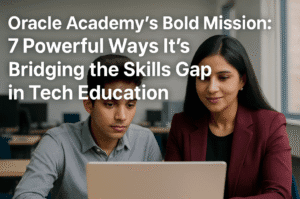Oracle Academy’s Bold Mission: 7 Powerful Ways It’s Bridging the Skills Gap in Tech Education
On April 9, 2025, Oracle Academy partnered with Oracle’s Technology Solutions Engineering Team in Noida, India, to host 34 educators from 18 institutions, addressing the critical tech skills gap in academia. The event highlighted how Oracle’s cloud computing, AI, and database technologies—such as Oracle Cloud Infrastructure (OCI) and low-code platforms—can transform curricula into career-launching tools. Educators learned to integrate these tools through hands-on demos, while success stories from professors revealed improved student engagement and job placements via Oracle certifications. A dedicated portal, the Member Hub, emerged as a vital resource for free curricula and community support.
Panelists urged systemic collaboration, like co-designing courses with industry experts and embedding micro-credentials into degrees. By bridging theoretical learning with real-world applications, the initiative aims to create a workforce fluent in cutting-edge tech. The event underscored a global need: academia and industry must innovate together to prepare students for tomorrow’s challenges.

Oracle Academy’s Bold Mission: 7 Powerful Ways It’s Bridging the Skills Gap in Tech Education
On April 9, 2025, Oracle Academy and Oracle’s Technology Solutions Engineering Team hosted a landmark event in Noida, India, uniting 34 educators from 18 institutions across North India. The gathering wasn’t just another industry-academia meetup—it was a strategic response to a pressing global challenge: equipping students with future-proof skills in a rapidly evolving tech landscape. Here’s why this collaboration matters and what it means for education.
The Urgency: Closing the Skills Chasm
Anuradha Sharma, Head of Oracle Academy South Asia, opened the event with a stark truth: “By 2030, over 85 million jobs could go unfilled due to a shortage of skilled workers.” This gap is particularly acute in tech-driven fields like cloud computing, AI, and data science. Educators face a dual challenge: keeping curricula relevant while ensuring students gain hands-on experience with tools used in the real world.
Oracle Academy’s answer? A symbiotic model where academia doesn’t just follow industry trends but co-creates with tech leaders.
Oracle’s Tech Stack: From Classrooms to Careers
Sanjeev Chauhan, Oracle’s VP of Solutions Engineering, set the tone by showcasing how technologies like Oracle Cloud Infrastructure (OCI) and AI-driven analytics are transforming sectors from healthcare to finance. But the real takeaway for educators? These tools aren’t just for Fortune 500 companies.
Mitika Garg and Abhishek Sikder, Oracle technologists, demonstrated how even foundational courses can integrate Oracle’s stack:
- Database Management: Using Oracle Autonomous Database for real-time data projects.
- AI/ML: Leveraging OCI’s pre-built models to teach predictive analytics without coding overhead.
- Low-Code Platforms: Empowering students to build apps with Oracle APEX, fostering creativity and problem-solving.
“It’s about demystifying enterprise tech,” said Sikder. “When students use the same tools as professionals, they graduate as problem-solvers, not just theory learners.”
Success Stories: Educators Leading the Charge
Three professors shared tangible results from embedding Oracle tools into their syllabi:
- Anil Kumar (Manipal University Jaipur): Students using Oracle Cloud earned certifications that led to internships at top IT firms.
- Archana Agarwal (Inderprastha Engineering College): Capstone projects with Oracle APEX reduced dropout rates by 22%, as learners saw direct career links.
- Subhash Gupta (Galgotias University): Collaborations with Oracle experts helped design a new AI elective, now the school’s most enrolled course.
Their message? Resources like Oracle Academy’s Member Hub—a centralized portal for curricula, certifications, and community support—are game-changers for time-strapped faculty.
Hands-On Innovation: AI and Cloud Demos
Afternoon sessions turned theory into practice. Oracle engineers Ankur Parashar and Prateek Thakur guided educators through:
- Cloud Labs: Simulating real-world scenarios like optimizing supply chains with OCI.
- AI Workshops: Using Oracle’s no-code AI tools to analyze datasets, from traffic patterns to medical diagnostics.
“Seeing a professor build a fraud-detection model in 20 minutes was eye-opening,” said one attendee. “It’s not about complexity—it’s about applicability.”
The Bigger Picture: A Call for Systemic Change
The day ended with a panel on redefining industry-academia partnerships. Key insights included:
- Curriculum Co-Design: Involve engineers in shaping course outcomes (e.g., Oracle’s input on AI ethics modules).
- Micro-Credentials: Embedding certifications like Oracle’s Cloud Infrastructure into degrees to boost employability.
- Faculty Upskilling: Regular “train-the-trainer” sessions to keep pace with tech advancements.
“This isn’t just about Oracle,” stressed Sharma. “It’s a blueprint for how all tech firms can become active stakeholders in education.”
Why This Model Works
Unlike generic CSR initiatives, Oracle Academy’s approach focuses on scalable empowerment:
- Access Over Cost: Free resources eliminate budget barriers for institutions.
- Community-Driven Learning: The Member Hub fosters peer-to-peer knowledge sharing across 15,000 global institutions.
- Future-Forward Metrics: Tracking not just placements, but how alumni apply Oracle tools to solve local challenges.
The Road Ahead
As educators left Noida, many were already drafting plans: revised syllabi, industry advisory boards, and student hackathons using Oracle tech. The event underscored a universal truth: bridging the skills gap requires more than textbooks—it demands authentic partnerships where academia and industry innovate together.
For institutions worldwide, the message is clear: The tools to future-proof education exist. The next step is embracing collaboration over convention.
You must be logged in to post a comment.